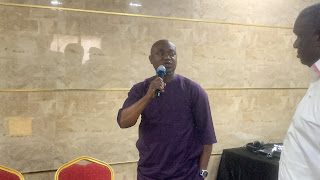DRUG ABUSE TOPS DISCUSSIONS AS KEY CONFLICT ISSUE IN RIVERS STATE, AT THE MEETING OF STATE PEACE ARCHITECTURE (Photos)
Drug related conflicts were top
on the list of key conflict issues at a meeting of the Rivers State Peace
Architecture (SPA) and the Steering Committee of the European Union funded
project, “A Community Centered Approach To Transforming Violence and
Criminality in the Niger Delta (CRIN-VIN)”.
The State Peace Architectures were
set up as part of the CRIN-VIN project being implemented by Search For Common
Ground, in partnership with Stakeholders Democracy Network (SDN), Foundation
for Partnership Initiative in the Niger Delta (PIND) and Academic Associate
Peaceworks (AAPW), aimed at fostering inclusive community security approaches
to addressing the systemic drivers of violence and criminality in the Niger
Delta.
The SPA meeting which held in
Port Harcourt, was organized to discuss on the progress of the community, local
government and state level peace architectures of the project, to identify key
conflict issues in their various focus areas, and to elaborate on early
warning/ early response strategies to resolve conflict issues in Rivers State.
The meeting was attended by representatives
of the Nigerian Police Force, Nigeria Security and Civil Defense Corps (NSCDC),
National Drug Law Enforcement Agency (NDLEA), Department of State Services
(DSS), Association of Informal Workers, Government officials, Civil society
Organizations, the media and other stakeholders.
The SPA group which is chaired by
Patrick Ndukwe and co-chaired by Chief Rose M.B Zoranen also deliberated on
possible solutions to these key conflict issues and how stakeholders can
collaborate towards resolving conflict issues flagged at the community, local
government and state levels.
Speaking at the meeting, Country
Director of Search For Common Ground, Fatima Abubakar stated that the project
is aimed at establishing joint initiatives that includes youth, women and other
marginalized groups, to explore intergenerational dialogues and conversations
that identifies the divisive, and the drivers of conflicts, criminality and
violence in the communities. She added that these engagements will help to
empower local communities and address issues of social inclusion, lack of
economic opportunities and environmental degradation.
Fatima applauded the community,
local government and state representatives for sharing the issues arising in
their communities, and for the planning and coordination of the project so far.
She called for the inclusion of more institutions and actors in the conversations,
to achieve sustainable peace.
Addressing issues of crime in
some of the communities and local government areas, The Rivers State
Commissioner of Police, Olatunji R. Disu who was represented by the Divisional
Police Officer in charge of Olu Obasanjo Police Station, James Abba pledged the
command’s collaboration in tackling the crime and conflict issues discussed by
the SPA.
Responding to calls for Police
outposts to be set up in some high risk areas, Abba promised to relay the message
to the commissioner, who will be willing to support in that regard, as long as
it is geared towards achieving a crime free state.
He also pointed out that the
Rivers State Police is aware of the ‘bad eggs’ in the force, and is doing its
best to fish them out.
Also speaking at the meeting,
Deputy Commander of Narcotics and Deputy State Commander and Training of the National
Drug Law Enforcement Agency, Emmanuel Ogbumbada acknowledged the prevalent
issues of drug abuse in the state, blamed the rise in drug related issues to
government negligence.
He stressed that drug abuse is
not just a social challenge but also a health challenge that can result to
brain damages, which translates to repulsive behaviours amongst drug addicts.
While admonishing the public to
report drug related offenses to the NDLEA, he also revealed that the NDLEA has
a rehabilitation center for male drug addicts while females can be rehabilitated
in government owned hospitals in the state , as addicts are treated as victims.
One of the consortium partners of
the project, Foundation for Partnership Initiative in the Niger Delta (PIND) was
represented by its Project Coordinator, Aniekan Archibong who spoke after the
SPA meeting, expressed his confidence in the peace building initiative of the
CRIN-VIN project, owing to the dynamics of the conversations and the
stakeholders engaged in the process.
He added that the project is in
line with PIND foundation’s objective of promoting equitable peace and economic
development in the Niger Delta. According to him, the adoption of the early
warning and early response field monitors will further strengthen community inclusions
in the peace building process.
The project “A Community Centered Approach to
transforming violence and Criminality in the Niger Delta (CRIN-VIN)” is being implemented
in 60 communities across 33 local government areas in Bayelsa, Delta and Rivers
State, by leveraging on stakeholders participation in identifying key conflict
issues and the peace building/ conflict resolution processes.



















Comments
Post a Comment
Elvira’s Pen